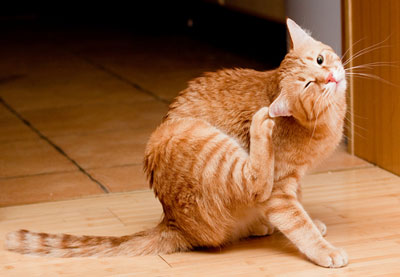Lice in Cats

Lice infestation. It's a common fear among parents and childcare professionals. Every time you see your child scratch his or her head, it probably crosses your mind.
One thing that many people also think about when it comes to lice is their cats. Can cats get lice, and do cats and humans pass them back and forth?
Feline Lice
Lice are tiny, dark-colored bugs without wings. In cats, the most common type of louse is the Felicola subrostratus.
Lice attach to a cat's hairs, then feed from there. They lay eggs on the hair shafts.
Lice cause a cat to be quite itchy, and an infected cat may scratch incessantly and lose hair. If you look carefully, by parting the hair, you can often see the dark lice or the light-colored, sticky eggs.
Lice are most common in very young, very old, debilitated, or outdoor cats as well as those in catteries or shelters.
Cats get lice by contacting another cat that has them or by picking them up in the environment, where they fell from another infected cat.
Can Cat Lice Spread to Dogs or Humans?
Lice are species-specific. That means that human lice only affect humans, and cat lice only affect cats. If your cat has lice, you don't need to worry that you or your kids will catch them, or vice versa. However, lice are highly contagious between members of the same species.
Treatment of Lice in Cats
Many topical treatments effectively treat lice in cats. Your veterinarian is best suited to choose one for your cat based on individual circumstances and other medical conditions.
Never use an over-the-counter product or one meant for dogs on your cat without checking with your veterinarian first. Many of them are toxic to cats.
You will need to be sure to wash all of your cat's bedding and vacuum well while your cat is undergoing treatment for lice to minimize the chances of reinfection from the environment.
You May Also Like These Articles:
Cat Fleas: Does My Cat Have Fleas?
Tips for Finding Fleas on Your Cat: VIDEO
Bubonic Plague: Cats are Highly Susceptible
Worms in Cats: Feline Intestinal Parasites
Notice: Ask-a-Vet is an affiliated service for those who wish to speak with a veterinary professional about their pet's specific condition. Initially, a bot will ask questions to determine the general nature of your concern. Then, you will be transferred to a human. There is a charge for the service if you choose to connect to a veterinarian. Ask-a-Vet is not manned by the staff or owners of CatHealth.com, and the advice given should not delay or replace a visit to your veterinarian.



